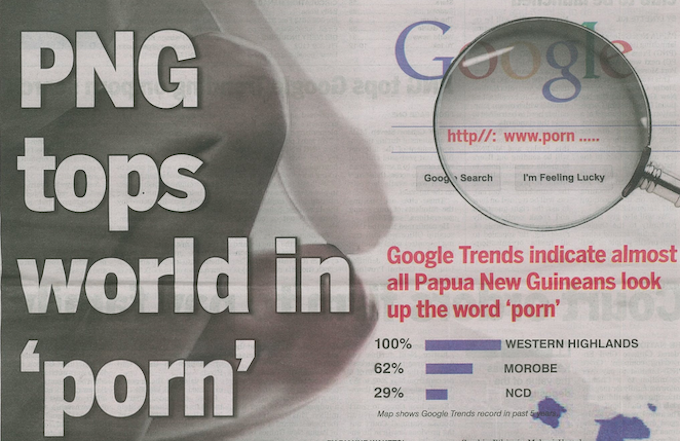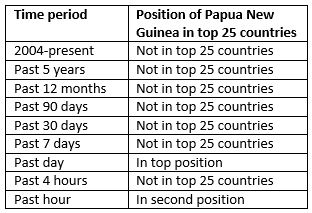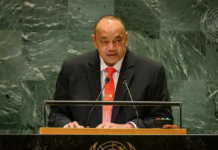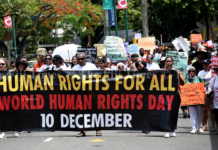By Dr Amanda Watson in Port Moresby
In Papua New Guinea, the Post-Courier featured a front-page story with the headline “PNG tops world in ‘porn’ search” on January 17. In previous years, there have also been similar stories asserting that PNG beats all other countries when it comes to internet searches for pornography.
For any nation, this accolade would be unwelcome. As PNG prides itself on being a Christian country with strong traditional cultures and values, coupled with tough laws banning importation of pornographic magazines and movies, the headline has produced consternation.
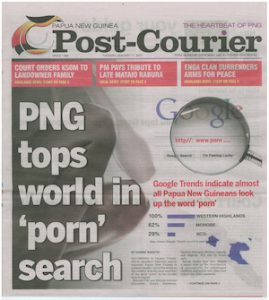
The ruling political party in PNG has released a statement and the competing newspaper has also published a response. Both reactions argue that the Post-Courier’s front page story is inaccurate.
The front-page article included the assertion that 100 percent of all internet searches in Western Highlands Province are for the term ‘porn’. Clearly, not every internet search in that province includes this term.
So, what is going on? My blog examines the source of the newspaper story and assesses its credibility. It also discusses internet access trends in PNG.
The source of the media reports is Google Trends. This is an interactive website run by Google, probably the world’s most popular internet search engine, which presents information about the searches that are conducted through Google.
For instance, a user can type in the word “car” and see information about how popular the search term is over time and also where it is popular, comparing regions, countries and cities.
First glance
At first glance, the site appears to suggest that 100 percent of all searches conducted using Google in the United Kingdom feature the word “car”. But this is not possible. There’s no way that all of the people in Wales, Scotland and other parts of the United Kingdom only ever use Google when they want to find out information about different kinds of motor vehicles.
Instead, the way it works is that the figures represent rankings, not percentages. The Post-Courier’s story was misleading in that it included percentage symbols alongside bar graphs. As Google Trends explains: “100 is the location with the most popularity as a fraction of total searches in that location”.
In other words, the United Kingdom had more searches during the time period for the word “car” compared to other countries, as a percentage of the total number of searches, which would also have included many other words, including “weather”, “news”, “school”, “restaurant”, “bank” and more.
Another example is the term “Highlands”. When inserted into Google Trends, bar graphs appear showing 75 for PNG. Again, this does not mean that 75 percent of the Google searches conducted by people in PNG are for this word.
Instead, it means that compared to other countries – where, for example, the term “mountains” might be more commonly used – the term “Highlands” is searched for fairly frequently in PNG.
Now, turning to the term “porn”, when looking at trends over the past five years, PNG is not listed in the top 25 countries. In fact, when the author visited the Google Trends website shortly after the Post-Courier story was published, it proved difficult to replicate the Post-Courier’s results.
I changed the time period to the past 12 months and the results revealed that once again PNG did not feature in the top 25 nations. I generated similar results for other time periods, as is shown in Table 1.
Table 1: Country rankings: Google Trends enquiries on 26 January 2017 using the term ‘porn’
Difficult to check
It’s important to note that the Post-Courier’s findings were not easy to duplicate and that in fact PNG does not feature in the top 25 listing for most time periods. Google Trends results are constantly being updated in real time and therefore it is very difficult to check or verify the Post-Courier’s story.
In addition, the tool only presents the top 25 countries – therefore it is not possible to determine a country’s actual ranking if it does not appear in the top 25.
It’s also helpful to point out that the size of a country’s population does not impact upon the ranking, as the ranking refers to the frequency of use of a word, for instance “porn”, as compared to all other words inserted into Google in that place, including “school”, “highway”, “buai”, “election”, “Highlands”, “Australia”, etc.
In other words, the word “Highlands” is used in PNG more often as a percentage of all searches, compared to the word “mountains”. It’s also worth noting that some users may have blocked their location, meaning that Google cannot tell where they are based, and this would of course make any data regarding locations of searches somewhat inaccurate.
Western Highlanders might also be curious to know how their province rates. While the Post-Courier showed a graph suggesting that the Western Highlands is the province with the most searches for the term “porn” versus other words used, compared to other provinces of PNG, the results are inconsistent.
As is shown in Table 2, Western Highlands Province (WHP) moves around the rankings a great deal, depending on the time period in question. For instance, in the past 7 days, WHP didn’t feature at all in the top ten provinces, whereas it’s in the top position when looking at the last 5 years.
When focusing on other provinces, their positions also move around a great deal. In short, the author feels that the rankings vary so much when comparing provinces in PNG as to be meaningless.
Table 2: Western Highlands Province (WHP): Google Trends enquiries on 26 January 2017 using the term ‘porn’
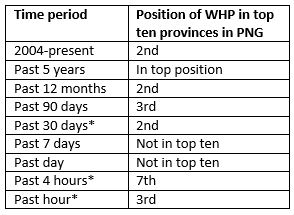 Note: Google Trends results are only showing for the first four provinces in the “past 30 days” time period, for the first eight provinces in the ‘past 4 hours’ category and for the first five provinces in the “past hour” time period.
Note: Google Trends results are only showing for the first four provinces in the “past 30 days” time period, for the first eight provinces in the ‘past 4 hours’ category and for the first five provinces in the “past hour” time period.
Significant improvement
In the last couple of years there has been a significant improvement in the accessibility of the internet in PNG, due to mobile network upgrades and expansions, as well as availability of cheap smartphone handsets.
While most people in PNG still do not have access to electricity, many do now live within mobile network coverage. The majority of this coverage is second generation (2G) which is suitable only for voice calls and text messaging.
But around urban centres, both Digicel and bmobile Vodafone now offer third generation (3G) service, which can be used to surf the internet, correspond through email and use social media platforms such as Facebook and WhatsApp.
In Port Moresby and Lae, Digicel offers 4G service. Telikom PNG is in the process of launching a new, digital mobile phone service which will aim to compete with the other players.
All these changes have meant that a growing number of people in PNG are accessing the internet for the first time. In particular, the number of Facebook users based in PNG continues to rise. Interest in and use of Facebook is fuelled by mobile phone companies offering special promotions through which Facebook use is either free or very cheap.
Nonetheless, many people in PNG still use basic handsets and rarely access the internet, if ever.
In short, this context means that many of the internet users in PNG have only had internet access for a year or two. As people in PNG are among the latest in the world to gain access to the internet, they may be unaware of the range of activities or kinds of searches that they could undertake through this medium.
Alarmist reports not helpful
Publication of alarmist, misleading reports suggesting that online porn consumption is sky-high in PNG is not going to help to strengthen understanding about the medium or how to use it.
Having examined the recent Post-Courier article and the Google Trends website, it’s now clear that the Post-Courier article was incorrect and that PNG does not necessarily rank highly for internet porn searches.
The assertion in the newspaper’s sub-heading that “almost all Papua New Guineans look up the word ‘porn’” is not supported by the evidence. It also seems plain that any comparison of provinces within PNG is unhelpful.
Even if patterns could be determined in the Google Trends material, given limited internet access and use by most people across PNG, it would be unwise to draw conclusions regarding how provinces compare to one another.
Further research will be required to unpack whether Google Trends does convey some useful data. Academic research would also be valuable in order to learn about the internet use of groups of people in PNG.
Amanda H A Watson is a lecturer in Public Policy at the University of Papua New Guinea (UPNG), based in Port Moresby under the UPNG-ANU partnership. She is also a visiting fellow with the State, Society and Governance in Melanesia Program at the Australian National University (ANU). This article was first published on the Development Policy Centre’s blog DevPolicy and is republished here with permission.







